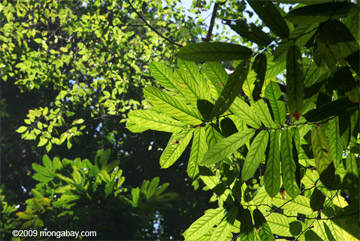Negotiators in Copenhagen have made progress on two key issues for the reducing emissions from deforestation and degradation (REDD) mechanism, reports a forest policy group.
John O. Niles, director of the Tropical Forest Group, said the latest REDD text has made “enormous strides” since earlier versions of the agreement last week.
“We needed two critical pieces of text to catapult into a world where
developing nations could see real value for saving tropical forests,” said Niles. “Forests and forest
peoples worldwide need ‘early action’ language to fast track financing to
save forests immediately. And the agreement needs clarification that
national forest reference emissions levels will be discussed and decided
with concrete timelines. Both of these critical dimensions of a new global
forest paradigm are now very much in play.”
 Rainforest in Costa Rica |
Niles noted that last week’s text did not include language to “force decisions on reference forest emissions levels” which would be needed to generate conservation funding for tropical countries.
Cara Peace, Tropical Forest Group’s Assistant Director for Policy, added that REDD is one of the few areas where significant progress has been made in Copenhagen.
“Saving tropical forests has positively catalyzed the climate change negotiations – it is the only beacon in an otherwise dark night,” she said in a statement.
The Tropical Forest Group also reported that the Holy See helped facilitate language on indigenous peoples rights in the REDD text.
Related articles
New REDD text is weak, say activists
(12/12/2009) Activist group have condemned the latest draft text of an agreement that aims to protect rainforests as a means to mitigate climate change.














